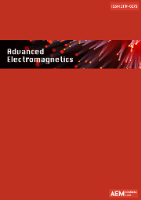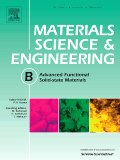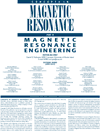
Journal of Magnetics
Scope & Guideline
Fostering a Community of Magnetic Thought Leaders
Introduction
Aims and Scopes
- Magnetic Materials and Properties:
Focuses on the synthesis, characterization, and optimization of magnetic materials, including rare-earth magnets, soft magnetic materials, and nanostructured magnetic compounds. - Magnetic Devices and Systems:
Explores the design, analysis, and performance of devices utilizing magnetic principles, such as motors, sensors, and magnetic fluid systems. - Magnetics in Medicine:
Investigates the application of magnetic technologies in medical diagnostics and treatment, including magnetic resonance imaging (MRI) and transcranial magnetic stimulation (TMS) techniques. - Magnetohydrodynamics and Fluid Dynamics:
Studies the interaction between magnetic fields and fluid flows, particularly in the context of magnetorheological fluids and their applications in engineering systems. - Electromagnetic Theory and Applications:
Covers theoretical advancements in electromagnetism and their practical applications in various technologies, including electromagnetic radiation shielding and detection methods.
Trending and Emerging
- Nanostructured Magnetic Materials:
There is a growing emphasis on the synthesis and characterization of nanostructured magnetic materials, particularly for applications in data storage, sensors, and medical devices. - Magnetics in Neuromodulation:
Research on the applications of magnetic fields in neuromodulation techniques, such as repetitive transcranial magnetic stimulation (rTMS), is gaining traction, reflecting increased interest in non-invasive therapeutic approaches. - Integration of AI and Machine Learning:
The incorporation of artificial intelligence and machine learning techniques in the analysis and optimization of magnetic systems is emerging, showcasing the potential for enhanced predictive capabilities and efficiencies. - Magnetorheological Materials and Their Applications:
Research on magnetorheological fluids and their applications in adaptive systems, such as dampers and suspensions, is on the rise, driven by advancements in material science and engineering. - Advanced Imaging Techniques:
A trend towards developing and optimizing imaging techniques that leverage magnetic properties, particularly in medical imaging, is evident, highlighting the journal's commitment to interdisciplinary research.
Declining or Waning
- Traditional Electromagnetic Field Analysis:
Research focused solely on classical electromagnetic field theories without integration of advanced computational methods appears to be waning as more sophisticated modeling techniques gain prevalence. - Static Magnetic Properties:
Studies emphasizing static properties of magnetic materials, such as basic coercivity and saturation magnetization, are declining in favor of dynamic and application-oriented investigations. - Basic Theoretical Studies without Experimental Validation:
Papers that focus exclusively on theoretical models without supporting experimental data are becoming less common, highlighting a shift towards more applied research that validates theoretical predictions.
Similar Journals

Advanced Electromagnetics
Connecting Ideas in Electromagnetics for a Brighter FutureAdvanced Electromagnetics, published by ADVANCED ELECTROMAGNETICS, GEEPS-SUPELEC, is an esteemed open access journal dedicated to the rapidly evolving fields of electrical and electronic engineering, as well as materials science, encompassing electronic, optical, and magnetic materials. With an ISSN of 2119-0275 and an established presence since 2012, the journal facilitates the dissemination of high-quality research and advancements, making substantial contributions to the scientific community. Operating from France, the journal proudly holds a Q3 quartile ranking in Electrical and Electronic Engineering for 2023, alongside rankings in Radiation and Electronic Materials. With a commitment to fostering innovation and interdisciplinary collaboration, Advanced Electromagnetics appeals to a broad audience of researchers, professionals, and students, encouraging them to share work that propels the field forward. Enjoy the seamless accessibility of research articles under an Open Access model, allowing for widespread dissemination and engagement with cutting-edge advancements in electromagnetics.

Transactions on Electrical and Electronic Materials
Advancing Innovation in Electrical and Electronic MaterialsTransactions on Electrical and Electronic Materials, published by Springer, is a distinguished journal aimed at advancing the fields of electrical and electronic engineering, as well as electronic, optical, and magnetic materials. With an ISSN of 1229-7607 and an E-ISSN of 2092-7592, this journal is vital in disseminating impactful research and innovations, providing insights and significant findings that cater to both academia and industry. Holding a Q3 ranking in the categories of Electrical and Electronic Engineering and Electronic, Optical and Magnetic Materials, it serves as a reputable platform for sharing research that influences ongoing developments in these critical areas. The journal's converged years from 2011 to 2024 signify its commitment to providing a comprehensive review of technological advancements. Located in New York City, it appeals to a global audience of researchers, professionals, and students, enhancing their understanding of current trends and practices within the domain.

SEMICONDUCTORS
Pioneering insights in condensed matter physics.SEMICONDUCTORS, published by PLEIADES PUBLISHING INC, is a prominent journal that provides a platform for researchers and professionals in the fields of Atomic and Molecular Physics, Condensed Matter Physics, and Electronic, Optical and Magnetic Materials. With an ISSN of 1063-7826 and an E-ISSN of 1090-6479, the journal has been diligently disseminating knowledge since its inception in 1996 and continues to pave the way for innovative research until 2024. Although currently unclassified in the Open Access model, its influence is underscored by its rankings in Scopus, where it ranks in the 21st-22nd percentile across critical scientific categories. SEMICONDUCTORS serves as an essential resource for cutting-edge research, fostering a greater understanding of semiconductor materials and their applications, thereby assisting the scientific community in pushing the boundaries of technology and innovation.

APPLIED MAGNETIC RESONANCE
Empowering Researchers in Magnetic Resonance ApplicationsApplied Magnetic Resonance, published by Springer Wien, stands as a pivotal academic journal within the realm of Atomic and Molecular Physics and Optics. Established in 1990, this journal has become a prominent platform for disseminating high-quality research papers that explore innovative applications of magnetic resonance technologies. With its ISSN 0937-9347 and E-ISSN 1613-7507, the journal is recognized for fostering a deeper understanding of the theoretical and practical aspects of magnetic resonance across various scientific fields. Despite its Q3 ranking in the 2023 Scopus category, it continues to attract a diverse readership interested in advancing the frontiers of physics. Researchers and professionals are encouraged to contribute their findings, as the journal not only enriches academic discussion but also influences real-world applications, making it an essential resource for burgeoning scientists and seasoned experts alike. Additionally, while the journal is not open access, its comprehensive articles can significantly enhance scholarly knowledge and inspire further research in this vital discipline.

Magnetochemistry
Empowering Open Science in MagnetochemistryMagnetochemistry is a premier academic journal dedicated to the study of magnetic phenomena in chemistry, published by MDPI, a globally recognized publisher known for its dedication to open science. Since its inception in 2015, this Open Access journal has provided a platform for researchers to share their findings and innovations in the fields of chemistry, particularly in the areas of electronic, optical, and magnetic materials. With a commendable impact factor and competitive ranking, including Q2 in miscellaneous chemistry and materials chemistry, and achieving notable placements within the Scopus ranks, Magnetochemistry stands out as a vital resource for professionals and students alike. By facilitating access to groundbreaking research, it significantly contributes to the advancement of the field, encouraging collaboration and further exploration among its diverse readership. Located in Switzerland, Magnetochemistry offers not only accessibility through its open access model but also a commitment to high-quality and impactful research outputs.

INTERNATIONAL JOURNAL OF APPLIED ELECTROMAGNETICS AND MECHANICS
Unveiling New Dimensions in Electromagnetic and Mechanical ApplicationsINTERNATIONAL JOURNAL OF APPLIED ELECTROMAGNETICS AND MECHANICS (ISSN: 1383-5416, E-ISSN: 1875-8800) is a prominent peer-reviewed journal published by IOS PRESS, based in the Netherlands. Since its inception in 1996, the journal has established itself as a vital resource for researchers, professionals, and students in the interdisciplinary fields of applied electromagnetics and mechanics, covering a broad spectrum of topics including mechanical engineering, electrical and electronic engineering, as well as condensed matter physics. Although it currently operates under a subscription model, its accessibility and relevance are underscored by its rankings in Scopus across several categories: notably, it ranks in the 34th percentile in Mechanical Engineering and 31st in Electrical and Electronic Engineering. With convergence anticipated until 2024, the journal aims to foster innovative research, promote interdisciplinary collaboration, and provide a platform for the latest advancements in electromagnetics and mechanics, thereby contributing significantly to the academic community and industry practices.

JOURNAL OF ELECTRONIC MATERIALS
Unveiling the Future of Materials ScienceWelcome to the Journal of Electronic Materials, a premier publication in the field of materials science. Published by Springer, this esteemed journal has been a beacon for groundbreaking research in electronic, optical, and magnetic materials since its inception in 1972. As an established resource, it boasts a commendable impact factor and categorically ranks in the second quartile (Q2) in key areas such as Condensed Matter Physics and Electrical and Electronic Engineering, as well as holding a respectable third quartile ranking in fields related to Electronic, Optical, and Magnetic Materials and Materials Chemistry. Researchers, professionals, and students can access a wealth of knowledge as we publish original articles, reviews, and cutting-edge research that push the boundaries of science and technology in these critical fields. Stay informed and engaged as we explore advancements that shape the future of electronic materials.

Materials Science and Engineering B-Advanced Functional Solid-State Materials
Pioneering Research in Advanced Material ScienceMaterials Science and Engineering B: Advanced Functional Solid-State Materials, published by Elsevier, stands as a pivotal platform in the realm of materials science, focusing on the development and characterization of advanced solid-state materials. With an ISSN of 0921-5107 and E-ISSN of 1873-4944, this journal operates out of the United Kingdom and addresses critical issues in condensed matter physics, mechanical engineering, and mechanics of materials. Its consistent recognition, evident in its Q2 quartile rankings across multiple engineering and physics categories and a respectable scope of convergence from 1988 to 2024, signifies its substantial contribution to the field. Researchers and professionals seeking a venue for cutting-edge work will appreciate the journal's commitment to advancing knowledge in functional materials, with its open access features ensuring that innovative findings are readily accessible. Join a community of leading scholars engaging with the latest advancements, shaping the future of materials science.

CONCEPTS IN MAGNETIC RESONANCE PART B-MAGNETIC RESONANCE ENGINEERING
Fostering Collaboration in the Evolving Field of Magnetic Resonance.CONCEPTS IN MAGNETIC RESONANCE PART B-MAGNETIC RESONANCE ENGINEERING is a premier journal published by WILEY-HINDAWI, dedicated to advancing the field of magnetic resonance engineering. With an ISSN of 1552-5031 and E-ISSN 1552-504X, this journal offers an Open Access platform since 2022, ensuring that research is freely accessible to scholars worldwide. Covering a broad spectrum of applications in medicine, radiology, nuclear medicine, and imaging, it serves as a key resource for professionals looking to stay updated with the latest advancements and innovations in the field. The journal enjoys notable rankings in various categories, including a rank of #137 in Medicine and #26 in Health Professions within Scopus, reflecting its importance and influence in both academic and clinical settings. As a vital conduit for cutting-edge research, CONCEPTS IN MAGNETIC RESONANCE PART B is committed to fostering the growth of knowledge while addressing the critical challenges and technological enhancements within magnetic resonance methodologies. Researchers, professionals, and students can expect to find comprehensive articles that adhere to high scientific standards, promoting discourse and collaboration across disciplines.

Computational Condensed Matter
Pioneering Insights in Computational Methods for Material ScienceComputational Condensed Matter, a reputable journal published by Elsevier, serves as a critical platform for advancing the understanding of condensed matter physics and related fields. Since its inception in 2014, the journal has become a pivotal resource for researchers and professionals dedicated to exploring electronic, optical, and magnetic materials, as well as materials chemistry and general materials science. With its current standing in the Q3 quartile across multiple categories in 2023, it ranks within the 60th percentile for Materials Science (miscellaneous) and the 54th percentile for Condensed Matter Physics in Scopus, reflecting its growing influence and relevance in the scientific community. The journal aims to publish high-quality, peer-reviewed articles that can foster innovation and collaboration in computational methods applied to condensed matter systems. Researchers interested in cutting-edge insights and methodologies will find Computational Condensed Matter to be an invaluable addition to their academic resources. For those seeking to contribute to or stay informed about the latest advancements in the field, this journal is a must-read.